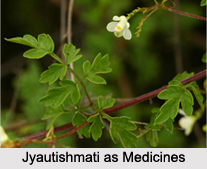 Jyautishmati, scientifically known as Cardiospermum Halicacabum is one of the most important medicinal plants in Ayurveda. The root of this climbing plant is described as emetic, laxative, stomachic and is used in combination with other remedies in rheumatism, nervous diseases, piles etc. The fried leaves of Cardiospermum Halicacabum are said to bring on the secretion of the menses.
Jyautishmati, scientifically known as Cardiospermum Halicacabum is one of the most important medicinal plants in Ayurveda. The root of this climbing plant is described as emetic, laxative, stomachic and is used in combination with other remedies in rheumatism, nervous diseases, piles etc. The fried leaves of Cardiospermum Halicacabum are said to bring on the secretion of the menses.
Dose of Jyautishmati in Medicine
Another prescription for amenorrhoea is as follows. Take jyautishmati leaves, sarjika, (impure carbonate of potash) Acorus Calamus root (vacha) and the root-bark of Terminalia tomentosa (asana) in equal parts and reduce to a paste with milk. This medicine should be taken in doses of about a drachm for 3 days.
This article is a stub. You can enrich by adding more information to it. Send your Write Up to content@indianetzone.com
Related Articles
History of Ayurveda
Origin of Ayurveda
Ayurveda Medication
Elements of Ayurveda
Concepts of Ayurveda
Ancient Literature of Ayurveda
Sushruta Samhita
Use of Vegetables or Plants as Medicines




















